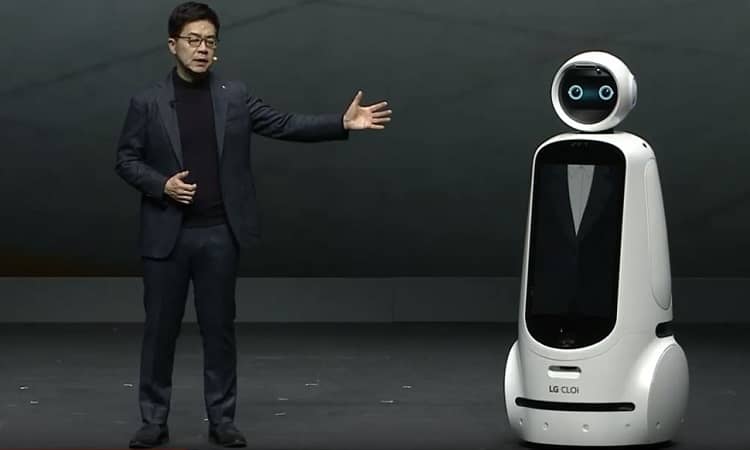In his opening keynote at CES 2019, LG president and CTO Dr. I.P. Park shared what the company envisions will be their direction moving forward. Among these, AI is seen to be a key factor and will expand in usage in relation with consumers digital lives. In his keynote Dr. Park outlined how the three key pillars of artificial intelligence would support a robust AI ecosystem in delivering real-world solutions.
LG has long been a leading proponent of consumer-focused AI technology and the moves taken at CES are not surprising for them. Also showcased were some of LG’s AI technologies implemented in daily-life scenarios for a better idea of what will be to come in the near future. During his address, Dr. Park also introduced the LG CLOi GuideBot, which has now become the first robot to help deliver a CES keynote.
“Is technology making your life better?” Dr. Park began his keynote by asking the audience. “Over the past 100 years, household appliances such as refrigerators, washing machines and vacuum cleaners have reduced time spent on housework by around 75 percent, but the amount of cognitive labour involved has significantly increased.” Dr. Park explained, “The answer lies in AI – but only if we can achieve true intelligence.”
Moving LG Beyond Consumer Electronics
Dr. Park also spoke on the ambition for LG to go beyond its current role as a consumer electronics manufacturer. He was keen on moving the company towards being a lifestyle innovator strongly supported by intelligent solutions. THis led to a description of the three pillars of AI he mentioned – Evolve, Connect and Open.
He also highlighted the importance of evolving intelligence in consumer electronics. For AI devices to go beyond simple voice recognition and automated task execution, they must be able to understand the purpose and intention behind each command. Such contextual understanding requires AI to evolve through accumulating interaction with the user.
LG is also extending its unparalleled consumer insight from home to the road with its innovative offerings for a new in-car experience. In the advent of an autonomous driving revolution, LG has set out to change and expand the very definition of vehicles from a means of transport to mobile space. LG’s AI-enabled cabin solution will help users make the fullest use of their time saved from not driving, turning their vehicles into a conference room, movie theater or even personal shopping boutique.
“Building this new in-car experience requires a wide range of different solutions in both hardware and software… which is why we need OPEN collaboration.” said Dr. Park, illustrating LG’s continued efforts to facilitate a culture of open innovation. He introduced LG’s collaboration with the leading seat manufacturer Adient to develop smart seats for a more personalized in-car experience. Also announced was LG’s new plan for its operating platform webOS which has been open sourced since March 2018. “From this year, we’ll be adding to webOS open access to LG’s own AI ThinQ platform for developers all around the world.” said Dr. Park.
Dr. Park then presented LG’s ambition to unlock the potential of AI technology a much larger scale by connecting hitherto individual units into intelligent systems. LG’s Robot Service Delivery Platform (RSDP) will systematically coordinate what multiple robots see, hear and learn to transform how we manage our work and our environment. AI-based smart grid will allow us to radically improve the efficiency of our energy ecosystem, from production and storage to consumption. Intelligent signage will turn the physical elements of space such as walls, signboards and even floors, into an active, intelligent part of environment.
Just prior to CES officially commencing, LG also unveiled the latest in its laser projectors, the 4K-capable HU85L CineBeam
Watch the LG Keynote here;


